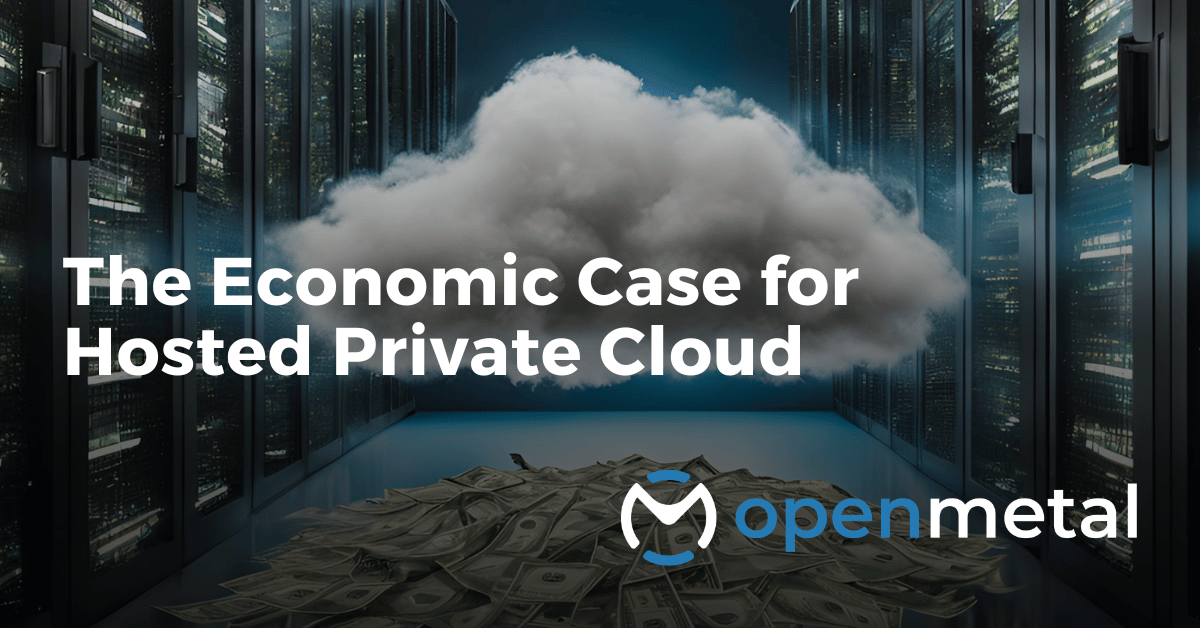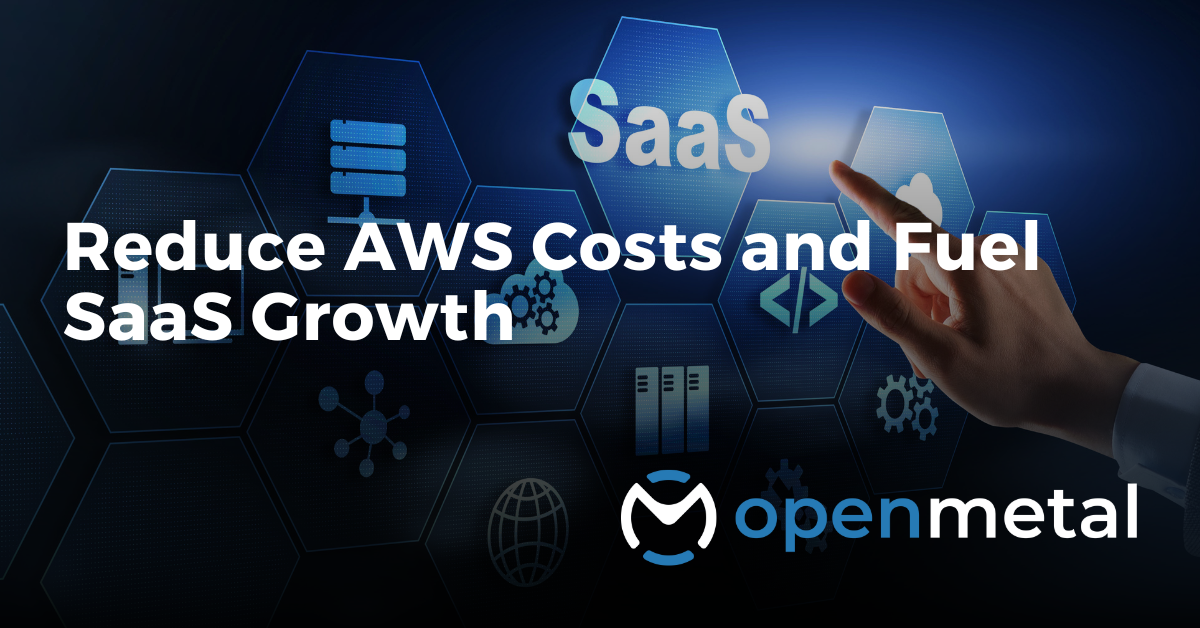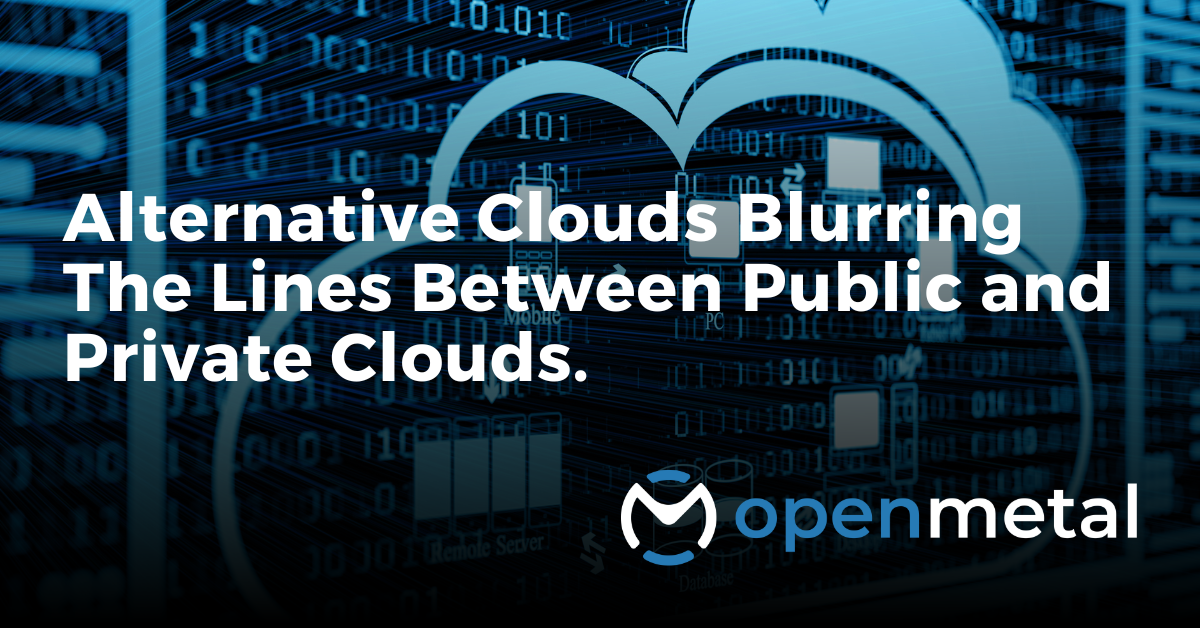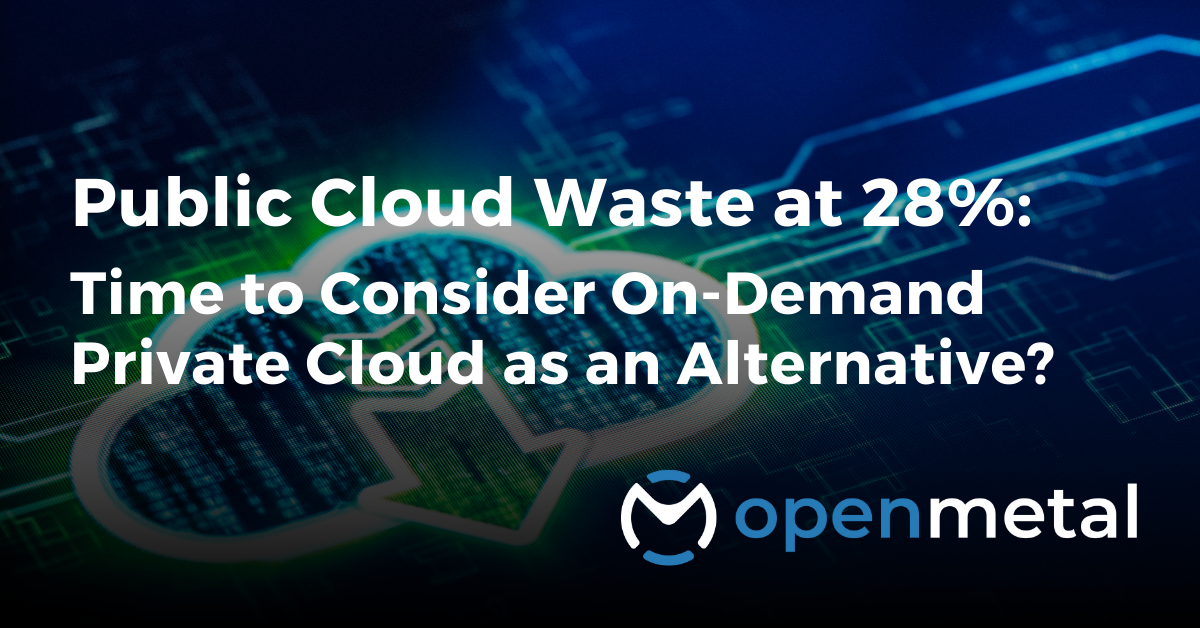A Plethora of Platforms
Commercial clouds have been around since the early 2000s, and just about every business relies on cloud in one way or another these days. Hosting choices and cloud deployment models have grown immensely since then – public cloud, private cloud, hybrid, multi, colocation, on-prem…it’s enough to make your head spin off into the clouds. But public cloud and on-premises private clouds have become two of the most popular choices for hosting your IT infrastructure.
Public cloud
While public clouds are known for flexibility and scalability, they tend to introduce challenges around control, security, and costs. You of course will be offered some predetermined choices of things like hardware types and storage capacity, but overall, public clouds boil down to “you’ll take what you’re given and you’ll like it!”
On-premises private cloud
Private clouds built on owned hardware offer the maximum amount of control and customization. But building your own infrastructure means hiring a team to manage it, refreshing that hardware every so often, dealing with maintenance and issues yourself, and shelling out a hefty sum from the start to invest in all that infrastructure. It can certainly be worth it in the long run, but for many companies, throwing down that much money isn’t a feasible option.
Hosted private cloud
And then, there’s hosted private cloud. Could it be a game changer for companies who want control and flexibility without the massive costs of buying and maintaining your own hardware? We think so – we wouldn’t sell it if we didn’t believe in it! This solution provides a middle ground between traditional on-premises infrastructure and public cloud environments.
Essentially, a hosted private cloud is a dedicated cloud infrastructure that’s managed by a third-party provider. It offers many benefits of a private cloud, like enhanced security and control, while eliminating the burden of managing the underlying hardware yourself.
If you’re trying to balance cost-effectiveness with control over your IT infrastructure, hosted private cloud should be on your radar. In this post, we’ll delve into a cost-benefit analysis of hosted private cloud, comparing it to both on-premises and public cloud solutions.
Comparing Clouds: Three Accommodation Situations
Determining the best cloud environment for you comes down to what you value, what you’ll be using it for, if you’re able and willing to get your hands dirty, and many other factors related to time, budget, control, and long-term needs. If you think about it, it’s similar to deciding where to live or stay, just with data instead of your physical self! So let’s discuss the pros and cons of public cloud, on-premises private cloud, and hosted private cloud using this analogy.
On-Premises Private Cloud: The Custom-Built Home
$$$
On-premises private clouds are like building your own custom home. You’ve got complete control over every detail, from the foundation to the finishing touches. It’s a lot of work and will take a relatively long time, but it can be incredibly satisfying.

Pros:
- Full control: With an on-premises private cloud, you’re the architect, the builder, and the interior designer. Every brick, beam, and wire is under your direct control. This level of customization allows you to fine-tune your infrastructure to meet the exact needs of your business, ensuring optimal performance, security, and efficiency.
- Potential for long-term savings: While the initial investment can be significant, the long-term benefits of an on-premises private cloud can likewise be substantial. By managing your infrastructure completely in-house (pun intended), you can avoid recurring costs associated with cloud service providers. Additionally, you have unlimited flexibility to optimize your resources, minimizing waste and maximizing efficiency.
Cons:
- High upfront costs: Just as with a house, the freedom and control that come with an on-premises private cloud come at a price. The upfront costs can be substantial, as you’ll need to invest in hardware, software, and the necessary personnel to manage your infrastructure.
- Ongoing management and maintenance: You’re not just building the house, you’ve also got to keep it clean, make repairs, and pay the property taxes. Ongoing maintenance, updates, and security measures for your on-premises infrastructure can be time-consuming and resource-intensive. You’ll need to ensure you have the dedicated staff and available time to handle it.
- Limited scalability: Need to add more rooms? It might take a while. Adding new capacity or modifying your infrastructure can be a complex and time-consuming process. This can hinder your ability to adapt to changing business needs or sudden spikes in demand.
Public Cloud: The Hotel Experience
$-$$$
With a public cloud, you’re renting a room in a massive hotel. You’ve got access to all sorts of amenities, from room service to a pool and spa. You can rent a room for a night, a week, or even a month. It’s incredibly flexible, but you don’t have much privacy or control over your environment.

Pros:
- Pay-as-you-go pricing: With public cloud, you only pay for the resources you actually use. This can be a huge advantage for businesses with fluctuating workloads or short-term projects. It’s easy to jump in and out as needed and budget for your usage. If you never grow past the tipping point where you’re spending more than you’re really getting with public cloud, you may be happy here forever!
- Vast resources and services: Need a supercomputer for a day? No problem. Public cloud providers offer a wide range of services and resources, from powerful compute instances to advanced data analytics tools. It’s like having a full-service hotel at your fingertips, with everything you need to run your business.
Cons:
- Security concerns: While public cloud providers implement robust security measures, you’re not 100% in control of your environment or privy to what’s going on behind the scenes. Sharing a cloud environment with other businesses will always introduce additional security risks. It’s like staying in a hotel with countless other guests coming and going each day and employees you may not fully trust. You might worry about the safety of your belongings or the potential for unauthorized access if security protections slip. Which, unfortunately, does happen a lot more than you may think.
- Vendor lock-in: Once you’re checked in, it can be a pain to switch hotels. Similarly, public cloud providers can sometimes make it challenging to migrate your data to another platform. You may notice that public cloud providers dole out free credits to new customers like candy. They want to make it a no-brainer for you to use their platform – it’s so easy to get started and nearly free, why not? But the more data you have on there, the harder it becomes to leave. Even when you scale and it’s not such a great value anymore, is it really worth the hassle to switch providers? They’re counting on this inconvenience to keep you locked in for the long haul.
- Compliance challenges: Public cloud environments can present compliance challenges for businesses in regulated industries. If you deal with sensitive customer data, you may need to ensure that your cloud provider meets specific compliance standards, such as HIPAA or GDPR.
Hosted Private Cloud: The Cozy Apartment
$$
This route is more like your move-in-ready apartment. The basics are all there, and you don’t have to worry about mowing the lawn or fixing the leaky faucet. With hosted private cloud everything is ready to go, issues and upgrades are someone else’s responsibility, and if you decide you want to go somewhere else it’s generally a smooth move out process.

Pros:
- Reduced upfront costs: Unlike building your own on-premises cloud, which can be a significant upfront investment, hosted private cloud offers a more affordable entry point. Just as with an apartment, you’ll simply choose the setup you like, sign some paperwork, pay the fee, and you’re ready to move in! By eliminating the need to purchase expensive hardware and take care of the setup yourself, you can save a substantial amount of money. Additionally, you can avoid the costs associated with hiring additional or re-allocating current IT staff. Your landlord, aka infrastructure provider, will handle much of the work associated with your cloud.
- Scalability and flexibility: Oftentimes we outgrow our living space and need to upgrade. Luckily, it’s a straightforward process to change or add onto what you have already. Need to increase operations or accommodate seasonal fluctuations in demand? With hosted private cloud, you can quickly scale your infrastructure up or down to meet your needs. This flexibility ensures that you’re not paying for resources you don’t use and can adapt to changing business requirements. If your provider offers multiple data center locations, as most do, you can also easily expand into new regions – nearly overnight, if you wish!
- Managed services: One of the biggest advantages of hosted private cloud is that you don’t have to worry about the day-to-day of your IT infrastructure. Your provider is your landlord, handling tasks such as system maintenance, security updates, and performance optimization. Your IT team can focus on higher-level strategic projects, and you don’t need to hire as many people either (unless you really want to! IT people are pretty cool.)
Cons:
- Potential for higher long-term costs: Factors such as usage patterns, pricing models, and the provider’s service level agreements can influence your overall expenses. We recommend looking into FinOps practices to help manage this, which involves optimizing cloud usage, tracking spending, and making data-driven decisions. As with any cloud, it’s important to ensure you’re not wasting resources, scaling up or down when it makes sense, and planning wisely (and proactively) for future needs. Clouds should not be thought of as a “set it and forget it” technology!
- Less control: Compared to on-premises private cloud, you won’t have as much say in the underlying infrastructure. Depending on your provider, you may be able to request specific upgrades or install custom hardware. But, for the most part, you’ll be choosing from what they have available. However, you’ll have root-level access to that hardware which isn’t available with public cloud. And you’ll likely be able to add any software you want to use, too.
The Economic Case for Hosted Private Cloud
Let’s talk money.
When it comes to cloud, cost is a major factor. You’ve got upfront costs, ongoing expenses, and potential savings to consider. Let’s look at the high-level total cost of ownership (TCO) you can expect for each option:
- Public cloud: Low upfront costs, but ongoing expenses can add up, especially if you’re not careful about your usage or grow quickly.
- On-premises private cloud: High upfront costs, but potential for lower long-term expenses if you can manage it efficiently.
- Hosted private cloud: Moderate upfront costs, but typically lower ongoing expenses compared to on-premises.
Which cloud option offers the best return on investment (ROI)?
Well, that depends on your specific needs and circumstances. Clearly, we’re fans of hosted private cloud and believe it offers the best cost-to-value ratio for most use cases and business plans. Here are just a few of the reasons why:
- Reduced downtime: With managed services, you can minimize downtime and ensure your applications are always running smoothly.
- Faster time to market: Hosted private cloud allows you to get up and running quickly, so you can start reaping the benefits sooner.
- Control and flexibility: You have more control over your infrastructure than with public cloud, while still enjoying the benefits of scalability and flexibility.
- IT staff efficiency: By outsourcing the management of your infrastructure, you can free up your IT team to focus on strategic initiatives instead of day-to-day upkeep.
- Enhanced security: Hosted private cloud providers typically have robust security measures in place, which can help protect your sensitive data.
In short, hosted private cloud offers a compelling economic proposition. But it may not always make the most sense for you! By taking upfront costs, ongoing expenses, and the potential benefits of each option into consideration, you can make the best choice for your company.
And remember – you don’t need to keep all your eggs in one basket! Many organizations opt for a blend of cloud styles for different needs and projects. But that’s an entire blog in itself.
Wrapping Up: Is Hosted Private Cloud the Right Economic Choice for You?
So, there you have it. Hosted private cloud is like a cozy apartment that’s ready for you to move in. It’s got nearly all the perks of an on-premises private cloud without the hassle of building and maintaining your own infrastructure. It may potentially cost you a bit more than other options in the long run, but for that spend you get to offload quite a bit of work and responsibility.
If you’re looking for a cloud solution that gives you the best of both worlds – control and flexibility without a lot of hassle or upfront investment – hosted private cloud might be just what you need.
Ready to take the next step?
Learn more about how OpenMetal’s hosted private cloud can benefit your business. Or, take a look at our hardware catalog and transparent pricing to start comparing costs yourself!
Learn About Our Hosted Private Cloud Check Out Hardware Catalog and Pricing
Read More on the OpenMetal Blog
Private Clouds in FinOps: Strategic Insights
As workloads grow and variable costs come into the mix, understanding your cloud invoice can become rather challenging. FinOps serves as the guide assisting organizations to navigate the financial intricacies of their cloud usage by providing the framework for interdepartmental collaboration.
Mastering Cloud Costs: On-Demand Private Clouds and the Future of Cloud Infrastructure
With the growing popularity of cloud services, organizations are continuously looking for ways to optimize costs and improve their IT infrastructure. On-demand private clouds have emerged as a viable solution for businesses to reap the benefits of both reduced costs and enhanced flexibility.
Public Cloud Waste at 28%: Time to Consider On-Demand Private Cloud as an Alternative?
This article presents the known benefits of private cloud, the factors that make organizations hesitant about the move, on-demand private cloud as the true alternative to public cloud, and also three business use cases that could reduce cloud spend while moving from a public cloud.







































